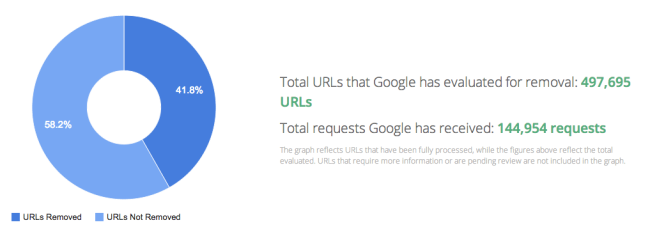Image via Robert Scoble/Flickr
Google said today it has complied with one-third of Europe’s ‘right to be forgotten’ requests. The internet search giant revealed social network Facebook has had the most URLs removed from search results as a result.
In May this year, in the case of Google Spain v AEPD and Mario Costeja González, the Court of Justice of the European Union found that individuals have the right to ask search engines, such as Google, to remove certain results about them.
The ruling surprised Google and many advocates of free speech, who likened the move to walking into a public library and censoring books.
Six months on, in a new transparency report, Google has revealed that after receiving some 144,954 ‘right to be forgotten’ requests, some 497,695 URLs had been evaluated for removal.
Google said it agreed to one-third of these requests while rejecting two-thirds of the requests.

The company received 18,304 requests from the UK, 24,979 from Germany, 28,912 from France, 13,330 from Spain, 11,380 from Italy and 1,443 requests from Ireland.
Google said that in assessing each request, it must consider the rights of the individual as well as public interest in the content.
Google revealed the sites most impacted by the removal requests included Facebook, which saw 3,332 URLs removed, Profileengine.com, which had 3,289 URLs removed, and YouTube, which had 2,392 URLs removed.

Examples of ‘right to be forgotten’ requests
- “(In the UK) we received a request from a former clergyman to remove two links to articles covering an investigation of sexual abuse accusations while in his professional capacity. We did not remove the pages from search results.”
- “(In Italy) an individual asked us to remove a link to a page that had taken a self-published image and reposted it. The page has been removed from search results for her name.”
- “(In Germany) an individual requested that we remove close to 50 links to articles about an embarrassing private exchange that became public. The pages have been removed from search results for his name.”
- “(In the UK) a doctor requested we remove more than 50 links to newspaper articles about a botched procedure. Three pages that contained personal information about the doctor but did not mention the procedure have been removed from search results for his name. The rest of the links to reports on the incident remain in search results.”